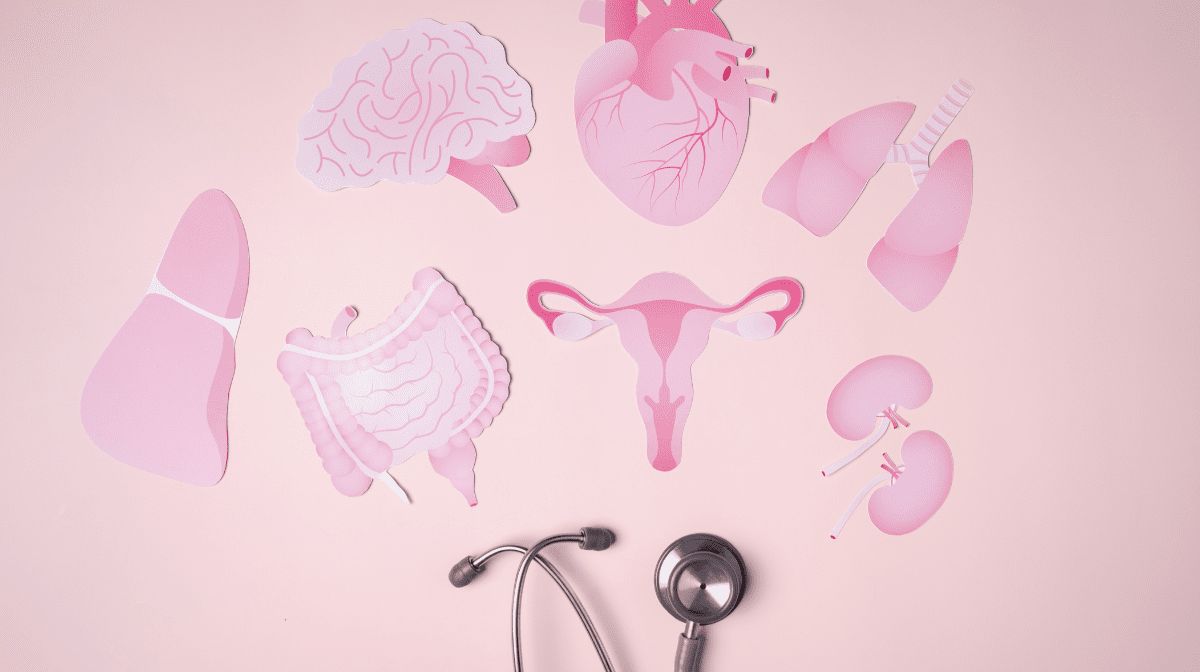Menopause is a natural part of a woman's life cycle. It's typically accompanied by a series of symptoms – some of which are readily discussed, whereas others are still surrounded by some taboo. Many of us may recognise hot flushes, night sweats, and even osteoporosis as common side effects of the menopausal transition. But less widely known are the mental and psychological symptoms of menopause – and their relationship with gut health.
Information about changes in the gut, and how these changes may affect mental and psychological symptoms during menopause, can be hard to come by. In fact, many women may not even know to seek this information out. This can be problematic for women in the menopausal transition – when it is already difficult to know why you feeling the way you are, and how to best look after yourself during this time. Knowing whether other women experience the mental side effects of menopause you’re experiencing can not only help you assess whether your symptoms are a major cause for concern, but it can also help you to feel understood, and less alone.
If you are feeling unwell, or have noticed changes in your physical and mental wellbeing, make sure to consult with a health professional. Once you have been assessed, there are many lifestyle changes you can employ as you adjust to this new stage of living. On average, nearly three decades of life are spent post-menopause. This is a time to enjoy yourself, to thrive, and to find joy in your new and changed body.
When does menopause happen?
Menopause marks the point a year after a woman’s last period,[1] and it typically affects women between the ages of 45 and 60.[2]
Menopause is different from perimenopause – which is the period of transition leading up to menopause. During perimenopause, women may experience many of the tell-tale menopausal symptoms – such as hot flashes, night sweats, and even changes in cognition[3] – as well as irregular periods.
How menopause can impact mental health
Many women experience mood swings, anxiety, and even depression during menopause.[4] There are a number of possible reasons why this is the case – and often, it is due to a combination of one or more factors such as the following:
Hormonal changes
The production of female sex hormones such as estrogen declines during menopause.[5] These hormones play important roles in brain function, and though research is still ongoing, this new imbalance may be a reason why women experience changes in mood and brain function during the menopausal transition.[6]
Mild symptoms of depression experienced during menopause have been linked to hormonal changes in some studies. This may be explained by changes to the levels of progesterone and estradiol – which is a form of estrogen – during this time.[7]
The gut-brain axis
The brain is connected to the gut via a pathway called the gut-brain axis. Emotions are communicated along this pathway to the gut, which is why we might talk about ‘butterflies in our stomach’ or our stomach being ‘in a knot.’[8]
The gut brain axis is also bidirectional, meaning that your gut health can have an impact on your mental well-being as well.[9]
There is some evidence to suggest the gut changes as we grow older.[10] The gut microbiome – which is the collection of microorganisms that live in the gut – also appears to be composed differently in males and females,[11] so these changes may look different between men and women.
Research has found that a woman’s gut microbiome diversity is lower during menopause.[12] This finding could have significant implications on many aspects of women’s health, due to the role gut microbiome diversity has to play. For example: correlations between the gut microbiome composition and the occurrence of conditions like depression have been identified in some studies.[13]
In this vein, several studies have also correlated the diversity of the gut microbiome with sleep quality,[14] and stress.[15] Stress, sleep, and mental well-being can all affect each other – when one area is compromised, it’s possible to become caught in a negative, self-perpetuating cycle of stress, low mood, and little sleep. But focusing on supporting the health and diversity of your gut microbiome during menopause can be a way to avoid this.
Social and lifestyle changes
Menopause doesn’t always have the best timing. In fact, it usually occurs at a time marked by many other lifestyle changes, which can all have an impact on women’s health. It’s important to understand these and their impacts – so that you can look after your mental and physical wellbeing during menopause.
When you retire, no longer taking your morning commute to work can also have a surprisingly big impact on your level of physical activity – particularly if you cycled or walked part or all of the way to work, or even stepped out of the office during the day to get lunch.
Similarly, if you have pared back your participation in sports, going to the gym, or running because of health concerns, it may be hard to get the level of physical activity you need to thrive.
Friendships can change as you grow older too. Friends might downsize their houses and move, or you might start seeing less of people at work or at the kids’ school drop-off. These connections are important for our mental health, so fostering those where you can, and putting in the effort to keep making new ones, can help you through this time.
Supporting your gut health and mental health during menopause
Supporting your gut health and prioritising your mental wellness during menopause go hand in hand. A happy gut is a happy you, which is largely due to the gut-brain connection. Plus, activities such as exercise, taking a probiotic supplement regularly, and finding ways to relax can help to support your mental health and your physical health – including gut health.
Why exercise is important during menopause
Exercise is a great way to reduce stress and improve your mood. This is because exercise releases endorphins.[16] If you’re feeling low since perimenopause or menopause, exercising regularly may help to alleviate your symptoms. It is also known to lower symptoms of mild depression and anxiety, and improve your sleep.[17]
There is also research to suggest that exercise can make for a more diverse gut microbiome with a higher proportion of beneficial bacteria.[18] As we already know, the gut and the brain are connected through the gut-brain axis – so fostering ‘good’ bacteria in the gut by exercising regularly may help to lift your spirits, too.
Dealing with that empty nest feeling
For many women with children, the time those children start moving out of home can coincides closely with menopause. If you have children, the day the last one moves out can be heart wrenching – although you might put on a brave face so as to not let them know that. As much as it is a joyful thing to see your younglings grow and chase their dreams out in the world, this transition can feel a little lonely for many.
But it’s important to embrace this new era of your life as your own. It’s a chance to use your space to the fullest, and chase the social, academic, and artistic pursuits you may have been neglecting before. So have more dinner parties! Take up a new hobby, like painting, yoga, or playing a musical instrument. This is your time to grow, learn, and be free to enjoy the little things again.
Taking a regular probiotic supplement
We know already how important the gut microbiome composition is to all aspects of your health – including mental health. As the gut microbiome changes as you age and go through menopause, you can help support your gut microbiome by taking a regular probiotic supplement.
Sources
[1] https://www.nia.nih.gov/health/what-menopause
[2] https://www.healthdirect.gov.au/menopause
[3] https://www.frontiersin.org/articles/10.3389/frdem.2023.1098693/full#:~:text=The%20perimenopausal%20period%2C%20when%20ovarian,with%20recall%2C%20attention%20and%20language%20(
[4] https://www.nhsinform.scot/healthy-living/womens-health/later-years-around-50-years-and-over/menopause-and-post-menopause-health/menopause-and-your-mental-wellbeing
[5] https://www.endocrine.org/patient-engagement/endocrine-library/menopause
[6] https://www.theguardian.com/society/2023/jan/12/not-just-hot-flushes-how-menopause-can-destroy-mental-health
[7] https://www.health.harvard.edu/womens-health/menopause-and-mental-health
[8] https://www.ncbi.nlm.nih.gov/pmc/articles/PMC4367209/#:~:text=The%20gut%2Dbrain%20axis%20(GBA,microbiota%20in%20influencing%20these%20interactions.
[9] https://www.ncbi.nlm.nih.gov/pmc/articles/PMC4367209/#:~:text=The%20gut%2Dbrain%20axis%20(GBA,microbiota%20in%20influencing%20these%20interactions.
[10] https://www.ncbi.nlm.nih.gov/pmc/articles/PMC9379122/
[11] https://www.ncbi.nlm.nih.gov/pmc/articles/PMC9379122/
[12] https://www.ncbi.nlm.nih.gov/pmc/articles/PMC9379122/
[13] https://www.ncbi.nlm.nih.gov/pmc/articles/PMC9379122/
[14] https://www.ncbi.nlm.nih.gov/pmc/articles/PMC6779243/
[15] https://www.ncbi.nlm.nih.gov/pmc/articles/PMC6779243/
[16] https://www.mayoclinic.org/healthy-lifestyle/stress-management/in-depth/exercise-and-stress/art-20044469#:~:text=Exercise%20increases%20your%20overall%20health,%2Dgood%20neurotransmitters%2C%20called%20endorphins.
[17] https://www.mayoclinic.org/healthy-lifestyle/stress-management/in-depth/exercise-and-stress/art-20044469#:~:text=Exercise%20increases%20your%20overall%20health,%2Dgood%20neurotransmitters%2C%20called%20endorphins.
[18] https://www.ncbi.nlm.nih.gov/pmc/articles/PMC5357536/









